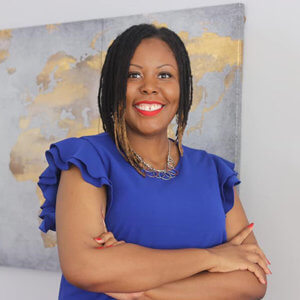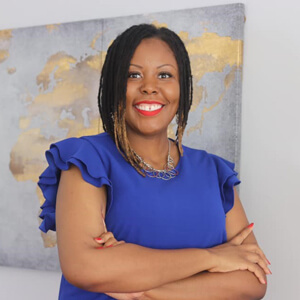An Interview with Jhmira Alexander, President, Public Narrative
Jhmira Alexander, President, Public Narrative
Social Entrepreneur, Educator and Encourager
Facebook – Jhmira Latrice Alexander
Twitter – @jhmiralatrice
Instagram – @jhmiralatrice
LinkedIn – Jhmira Latrice Alexander – https://www.linkedin.com/in/jhmiraalexander/
Tell me about your current role?
I am the president of Public Narrative, a thirty-year-old organization that works with journalists. We host events to connect journalists with the broader community of nonprofit organizations to draw out stories, build credible sources, and offer training for editorial rooms. Each year, we host the Studs Terkel Awards for journalists who get it right.
Many leaders in nonprofits are used to filling in wherever they’re needed. I steer the ship, lead the organization, direct mission, and make good on partnerships. I’m still getting acclimated with this particular role as it’s my first executive leadership role at a nonprofit. I’m learning that much of nonprofit leadership requires having an entrepreneurial spirit which is exactly what this role requires.
If there was a soundtrack of greatest hits related to your career, what songs would make the list?
Goapele’s “Closer” makes the list. In the song she talks about being closer to her dreams and so close that she can reach them. When I would listen to that song, I would envision what I wanted to do with my talent, skill and passion and work to cultivate them. At times I’ve been so close that when my own reality didn’t look like what I envisioned, a glimmer of my dreams would manifest, keeping me going.
Mali Music’s “Walking Shoes” talks about dreaming a dream that he hasn’t dreamed yet. It’s along the lines of instead of waiting for it to come to you, you have to go to it and stretch out a little bit further and further. I’m in that moment right now where I’m cultivating with other visionaries.
Another song on the soundtrack is Nas’ “The World Is Yours.” I’m a Nas fan and I follow him on Instagram. When that song was released, it was the first time I’d heard of him. Learning of his history and what he’s overcome gave me an appreciation for his story of endurance. That song walks you through moments in his life in Queens. The song is very poetic and rhythmic as he depicts and responds to what he sees.
Lastly on my soundtrack, the song “My Shot” by The Roots on The Hamilton Mixtape. I love their artistry; they are true musicians. That song is about making the most of opportunities. Even though many opportunities may come, I try to treat every single one like a steppingstone. That song captures what I try to practice through leveraging opportunities and not abusing relationships.
Work in the social sector can be very personal and linked to one’s values. Can you think of a time when your values were in tension and how you reconciled that tension or not?
I’m reconciling that tension now. (Laughter.) I left my own consulting practice to take this role. I didn’t seek out this role, but when it came, I had to identify the pros and cons of stepping away from my own practice. It really required me to think globally as I have a vision for international work and partnerships. I saw this opportunity as a way of accomplishing that. You have to take risks and leave some things behind. I had grown to love the work that I was doing and the opportunities that it afforded me. Early on, I really struggled with whether I had made the right decision. What did I do?I’d ask myself repeatedly.And little by little I would get answers to those very questions. I’m relieved to know that I made the best decision.
I can usually see the outcome but may not always see how to get there. I find myself constantly reconciling how to get there. Other questions emerge about how to remain on mission and assess assets and liabilities. The tension diminishes when I’m honest with myself about what has been outlived and is now needed to remain relevant. Surely, people remember Public Narrative from five years ago and Community Media Workshop from twenty-five years prior. I’m certain there are memories cherished by our community of supporters, though I find myself reflecting on the practicality of many of those memories. I have to assess the value of those memories to us now and there’s a lot of tension with that. Sorting through the past and future is interesting. There’s definitely a need for what we do, but there has to be a balance in how we deliver on our mission in Chicago and other places where we seek to scale.
Can you share an experience in the workplace where you have had to reclaim your time and what the context was?
I don’t have much time to reclaim since I don’t let people waste my time. I may pull away if it doesn’t appear that I’ll get a return on my investment. It’s not that I don’t give people or situations the benefit of the doubt, but I start with being honest with myself. What does this look like if we are invested? What does the truth of this actually look like?As humans we have the innate ability to assess when something is off or doesn’t sit right, but we have to act instead of allowing it to just be. I find myself preserving my time regularly by analyzing whether something is the best use of my time.
What’s your approach to self-care? Are there any rituals you use to survive and thrive?
Being by myself whether it’s going to the movies, dinner alone, massages, or simply doing nothing. Laying around all day in my pajamas. Reading a book or napping all day. Some may say that’s a sign of depression, but it isn’t for me. I have to be able to remove myself from everything in order to see clearer. I find that if I don’t have at least one of those days a week then I’m no good. I listen to my body when I need more rest…need more detachment. You can start off scheduling (detachment time), but one needs to graduate to a place where it becomes part of our existence: it’s the whole concept of self-care and consistently practicing it. I enjoy going to therapy. I’ve learned to be honest with myself and how not to involve the people I’m working through an issue with in my acts of self-work.
We come from a resilient and strong lineage. How would you describe the type of ancestor you want to be and why?
The kind of ancestor I want to be…you know what’s funny: I’ve worked from that space but never given it a description. I want to be known as helpful, direct, and someone with whom you never had to guess where you stood. A tenacious and fearless ancestor committed to my God-given purpose. I would hope that my ancestry shows people what it means to be faithful and fruitful while inspiring people to dig within themselves to fulfill their own life’s purpose. Lastly, I’d want to be remembered as an ancestor who didn’t accept the narrative set for me but took the necessary steps to rewrite narratives that didn’t define me as a Black woman.
What advice would you offer other Black women trying to develop or amplify their voice and become self-advocates?
Know who you are. Be honest with yourself. Stay your course. A lot of times, there are instances where we seek validation. I’m not saying that’s right or wrong, but in my experience, validation doesn’t always come in the way that you think it should. You need to be able to rest well at night and to look in the mirror and say: I’m proud of you. You overcame this. You didn’t give up.
Black women are often perceived as angry. It’s okay to be angry. It’s not okay to be labeled as angry. I once worked with a group of young Black women and asked them to replace the word “angry.” They used words like inspirational, encouraging, strong, courageous, powerful, and thoughtful. I have had to dig within to find that in myself; I couldn’t depend on anyone else to do that for me.
As Black women, we have to lavish the same love, care and compassion that we give to others on ourselves. From that overflow we should be able to feed our communities. If we don’t nurture ourselves, we can give and give and give and feel depleted. If we don’t begin to nurture ourselves, there will be nothing to give. We have been nurturers since the inception of this country; we were forced into it. It’s important that we polish and perfect the role for our own benefit before allowing our communities to become beneficiaries.
If you could change the social sector in a way that would benefit, lift up, or affirm Black women, what would that change be?
Recently, I saw an article that talked about how diversity is so popular but there are no results. We can start with Black women but need to spill over to all ethnicities when talking about diversity. We have to be able to prove it. There is a huge disconnect in society. If an impact were truly felt then we’d see greater impact throughout marginalized communities. Our democracy would reflect the impact as would our news headlines.



Comment section